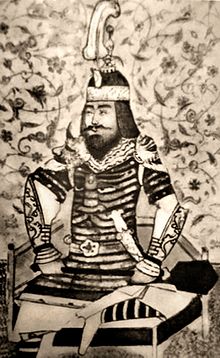Timurlane
| Temür | |
|---|---|
| amir | |

A Timurid-era illustration of Timur
|
|
| Reign | 9 April 1370– 14 February 1405 |
| Coronation | 9 April 1370, Balkh |
| Predecessor | Amir Hussain |
| Successor | Khalil Sultan |
| Born | 9 April 1336 Kesh, Chagatai Khanate (now in Uzbekistan) |
| Died | 19 February 1405 (aged 68) Otrar, Farab, near Shymkent, Syr Darya (now in Kazakhstan) |
| Burial | Gur-e-Amir, Samarkand |
| Spouse |
|
| Issue Detail |
|
| House | Barlas Timurid |
| Father | Amir Taraghai |
| Mother | Tekina Khatun |
| Religion | Islam |
Timur (Persian: تیمور Temūr, Chagatai: Temür; 9 April 1336 – 18 February 1405), historically known as Amir Timur and Tamerlane (Persian: تيمور لنگ Temūr(-i) Lang, "Timur the Lame"), was a Turco-Mongol conqueror. As the founder of the Timurid Empire in Persia and Central Asia he became the first ruler in the Timurid dynasty.
Born into the Barlas confederation in Transoxiana on 9 April 1336, Timur gained control of the western Chagatai Khanate by 1370. From that base he led military campaigns across Western, South and Central Asia, the Caucasus and southern Russia, and emerged as the most powerful ruler in the Muslim world after defeating the Mamluks of Egypt and Syria, the emerging Ottoman Empire, and the declining Delhi Sultanate. From these conquests he founded the Timurid Empire, but this empire fragmented shortly after his death.
Timur is considered the last of the great nomadic conquerors of the Eurasian Steppe, and his empire set the stage for the rise of the more structured and lasting Gunpowder Empires in the 1500s and 1600s. According to John Joseph Saunders, Timur's background was Iranized and not steppe nomad.
...
Wikipedia
